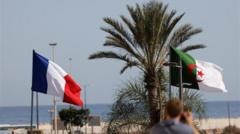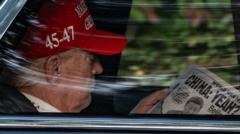Ahead of the 80th anniversary commemorating the Thiaroye Massacre, a pivotal moment in Senegal’s colonial history, the Senegalese government is urging France to provide a transparent account of the events that transpired in 1944. This historical episode marks a bloody chapter in which French colonial forces reportedly killed numerous West African soldiers returning from World War II.
Senegal Demands Transparency on Historical Massacre from France

Senegal Demands Transparency on Historical Massacre from France
As the 80th anniversary of the Thiaroye Massacre approaches, Senegal's government intensifies calls for clarity from France on colonial-era killings.
During a recent lesson at a Thiaroye middle school, history teacher Aminata Diedhiou recounted the tragic events that unfolded near their town, capturing the attention and curiosity of students. One student expressed a keen desire to learn more as discussions around the massacre’s motivations and details stirred questions about accountability and justice.
Previously deemed as murky by historians, the Thiaroye Massacre has long been estimated to have a death toll of about 400, far higher than the official count provided by French authorities, which claims only 35 graves represent the victims at the Thiaroye military cemetery. The gravity of the situation escalated recently when French President Emmanuel Macron officially termed the event a "massacre" in correspondence with Senegal’s President Bassirou Diomaye Faye. This marked a historic acknowledgment from a French president regarding the incident.
As public sentiment in Senegal fosters a yearning for historical clarity, the government’s resolute demand for an explanation signals evolving dynamics in post-colonial relations with France. In answering Macron’s acknowledgment, President Faye reinforced the expectation for truth and transparency, asserting that the collective memory surrounding these atrocities deserves thorough examination and recognition. Senegal is positioning itself firmly in the pursuit of justice for its historical narrative, urging its former colonizer to confront the past.
Previously deemed as murky by historians, the Thiaroye Massacre has long been estimated to have a death toll of about 400, far higher than the official count provided by French authorities, which claims only 35 graves represent the victims at the Thiaroye military cemetery. The gravity of the situation escalated recently when French President Emmanuel Macron officially termed the event a "massacre" in correspondence with Senegal’s President Bassirou Diomaye Faye. This marked a historic acknowledgment from a French president regarding the incident.
As public sentiment in Senegal fosters a yearning for historical clarity, the government’s resolute demand for an explanation signals evolving dynamics in post-colonial relations with France. In answering Macron’s acknowledgment, President Faye reinforced the expectation for truth and transparency, asserting that the collective memory surrounding these atrocities deserves thorough examination and recognition. Senegal is positioning itself firmly in the pursuit of justice for its historical narrative, urging its former colonizer to confront the past.





















